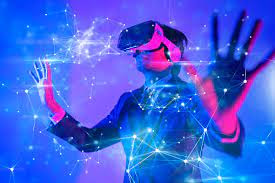What Is the Metaverse, Exactly?
To a certain extent, talking about what “the metaverse” means is a bit like having a discussion about what “the internet” means in the 1970s. The building blocks of a new form of communication were in the process of being built, but no one could really know what the reality would look like. So while it was true, at the time, that “the internet” was coming, not every idea of what that would look like is true.
On the other hand, there's also a lot of marketing hype wrapped up in this idea of the metaverse. Facebook, in particular, is in an especially vulnerable place after Apple's move to limit ad trackinghit the company's bottom line. It's impossible to separate Facebook's vision of a future where everyone has a digital wardrobe to swipe through from the fact that Facebook really wants to make money selling virtual clothes.
The paradox of defining the metaverse is that in order for it to be the future, you have to define away the present. We already have MMOs that are essentially entire virtual worlds, digital concerts, video calls with people from all over the world, online avatars, and commerce platforms. So in order to sell these things as a new vision of the world, there has to be some element of it that's new.
Spend enough time having discussions about the metaverse and inevitably someone will reference fictional stories like Snow Crash—the 1992 novel that coined the term “metaverse”—or Ready Player One, which depicts a VR world where everyone works, plays, and shops. Combined with the general pop culture idea of holograms and heads-up displays (basically anything Iron Man has used in his last 10 movies) these stories serve as an imaginative reference point for what the metaverse—a metaverse that tech companies could actually sell as something new—could look like. Buy land on metaverse

Komentarai
Rašyti komentarą